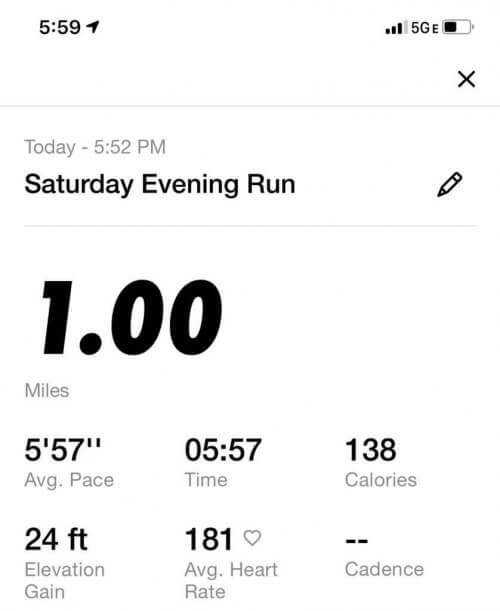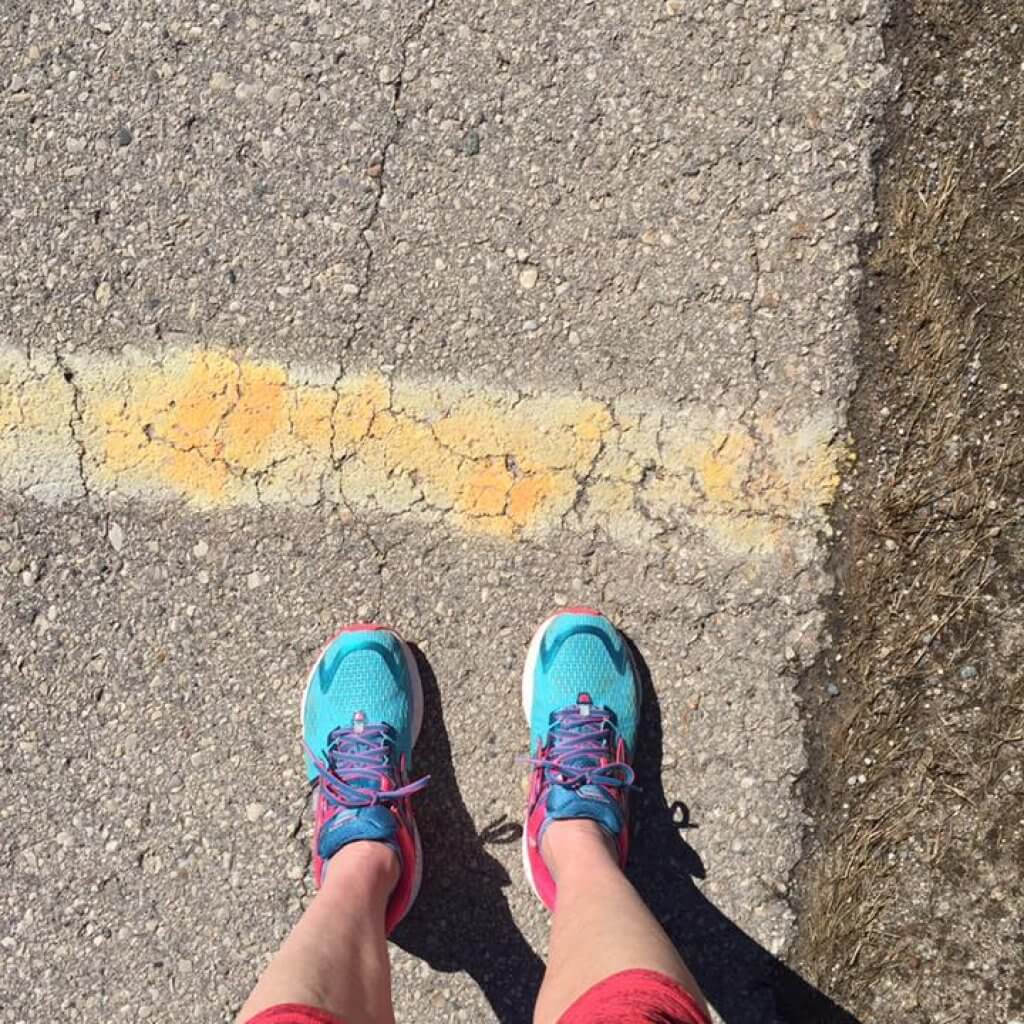8 Ways to Run a Faster Mile (According To Our Running Coach)

Prior to engaging in discussion around how to run a faster mile, I typically ask clarifying questions. The answers to these questions help me hone in on what that particular athlete needs to get faster. I am assuming that the person is trying to run one mile as fast as they can.
However, sometimes when people inquire how to run a mile faster, they are actually asking how to get their pace (within the greater context of a set distance of a race) faster. The answer to that is different.
Essential Questions To Be Answered First!
- Are you trying for a 1 mile PR (personal record)?
- How much time do you have to train for this faster mile?
- Are you training for a mile race or just a personal goal?
- If it is a race, is it on a track or on the road?
- What is your current mile PR?
- What have you tried in order to run a faster mile?
How Quick Should You Run One Mile?
This is difficult to answer. There are a lot of factors that go into play here. Expecting to run a mile as fast as someone else may not be in the cards for you. Your experience, level of training, age, body size, overall health and other things all are factors that determine how fast you will run a mile.
I can tell you that if you take your average 5K time and figure out your average minutes per mile, you can certainly run one mile considerably faster than that average pace. However, to do so you have to get comfortable with the idea of getting uncomfortable.
Why? Because running a fast mile is going to hurt. If you are doing it right and giving your 100% that is. The mile run is supposed to hurt.
Is a 6 Minute Mile Fast?
Is a six-minute mile fast? It depends on who you are asking. If you are at a high school track meet watching the boys run the mile, I can tell you a 6-minute mile is not very fast. The same is true of watching college or elite runners race on the track.

However, if you are at your local running group and you all decide to hammer out some mile repeats, a 6-minute mile is very fast.
Wondering how you can run and train for a 6-minute mile? Keep reading for advice on how to improve your mile time.
Setting the Baseline
If you have not tried to run a fast mile yet, you need to do so to establish your baseline. Before attempting to run a hard, fast mile, you need to warm up properly.
Jog very, very easy for at least 10 minutes. Once you have done that, do some dynamic stretches in order to completely warm up your body and get ready to run hard.
After you have done all of that, you are ready to toe the line. When I am planning to do a mile time trial, I choose a flat, straight stretch of road and put hash marks on the road every quarter of a mile. This helps me to know exactly how much further I have to go. Sure, I could run on a track… but I don’t for my mile time trials.
All you have to do now is click the “go” on your watch and hit it hard. Once you have run your baseline mile, you can start working toward improving it.

(Photo: one of the 1/4 mile lines on the road near my house).
How To Improve Your Mile Time
- Build Endurance: The first important thing to running a mile is you need to train to run further than a mile. My fastest 5K ever? It happened coming off of my marathon training. After running double-digit runs every Saturday for months, a fast 5K seemed super easy. The same will be true for your mile! Run a longer run every week. This run should be anywhere from 5-7 miles.
- Increase Turnover: You can do this by adding striders to your workout. After your run, do 8-10 short striders where you try to move faster and focus on your footfall cadence. If you count your footfalls for one minute of hard, fast running, try to increase the number of footfalls. This takes practice and work!
- Hill Work: Hill workouts are the workouts we all love to hate. Nonetheless, they are a necessary evil if you are looking to get stronger and faster. Warm-up properly, get to a hill, and do a set number of hill repeats up the hill. Start with 3-4 and work your way up to 9-10.
- Core Work: Strengthening your core helps you to run stronger and faster. I recommend at least 10-15 minutes of core work, 3-5 days each week. This is a real game-changer!
- Speed Work: Committing to dedicated speed work each week helps you run a faster mile. Hit the track for interval runs, pyramids, ladders and other speed workouts.
- Improve Form: There are many ways to work on your form including drills and having a coach help you analyze how you run. Running efficiency matters!
- Strength Training: Getting stronger will help you run faster. Period. Hit the weight room.
- Respect the Rest Day: Equally as important to the work you do is respecting the rest day. In addition, you cannot run hard and fast every single day. You need a balance of slower distance runs, tempo, speed work and days completely off of running. Getting adequate sleep is also important. Pay attention to all of this!
Personalizing Your Plan
Let’s jump back up to all of those questions asked in the beginning. Once you have done that, you are ready to come up with a plan. Be honest with yourself about what you have been doing so far, and how much you are willing to add to (or adjust) your training.
If you don’t have a mile race, pick a date about 8-10 weeks from now. Set yourself up a training plan where you put all of the things you plan to do in black and white.

Write in the 2-3 days each week you plan to do strength training. Work in your dedicated core work. Find some great YouTube videos (or training apps) that have short core workouts ready for you to just pull up and do.
Add speed workouts to your plan, and be sure you have a weekly long run. Find a hill you can do repeats at. In other words, construct a plan that will work for YOU and help bring you to success.
The more detailed you are in your plan, the more likely you are to succeed. Are you afraid you might falter and skip workouts? Find an accountability partner. It is helpful if it is someone who may work toward the same goal.
Set yourself a goal and put a visual reminder someplace you will see it often. This will help you keep focus. Once you have done all of that, you are ready.
Good luck!
Latest Articles
 Is Running on a Treadmill Easier Than Running Outside?Runners have their own preferences, whether it is treadmill running, running outside on the road, or exploring trails. So...
Is Running on a Treadmill Easier Than Running Outside?Runners have their own preferences, whether it is treadmill running, running outside on the road, or exploring trails. So... Is It OK to Use Trail Running Shoes on the Road?While trail running shoes can be used on roads, especially in situations where a runner encounters mixed terrains or pref...
Is It OK to Use Trail Running Shoes on the Road?While trail running shoes can be used on roads, especially in situations where a runner encounters mixed terrains or pref... How to Fix Sore Quads After Running?Rest, ice, gentle stretching, and over-the-counter pain relievers can help soothe sore quads after running. Also, ensure ...
How to Fix Sore Quads After Running?Rest, ice, gentle stretching, and over-the-counter pain relievers can help soothe sore quads after running. Also, ensure ... 10 Fruits With The Most Electrolytes to Replace Sports DrinksThese fruits are high in electrolytes such as potassium, magnesium, and calcium, essential for hydration, muscle function...
10 Fruits With The Most Electrolytes to Replace Sports DrinksThese fruits are high in electrolytes such as potassium, magnesium, and calcium, essential for hydration, muscle function...

